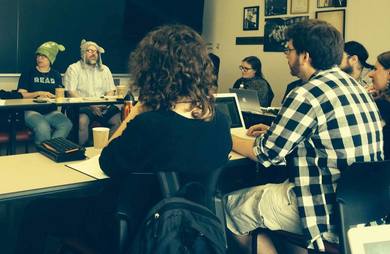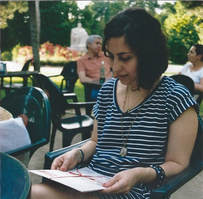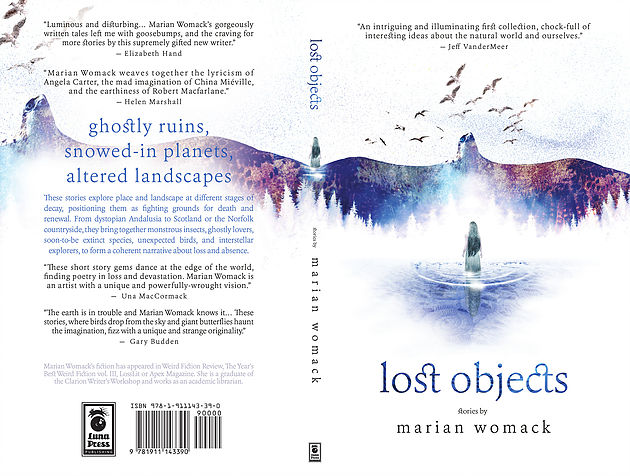|
Marian Womack was one of the amazing authors I had the privilege of spending six weeks with at the Clarion Fantasy and Science Fiction Writers Workshop in 2014. I first met her about a month before Clarion started, while my husband and I were visiting Spain. It was great to get off the regular tourist routes in Madrid, and also to get to know one of my classmates a bit better before the craziness of Clarion began. During the workshop, I was always impressed with her lush prose and gothic-influenced style, and I was thrilled to hear that a couple of her Clarion stories would be published in a collection—after making the rounds at places like Apex, Weird Fiction Review, and Year's Best Weird Fiction, of course. Just look at this gorgeous cover:
These stories explore place and landscape at different stages of decay, positioning them as fighting grounds for death and renewal. From dystopian Andalusia to Scotland or the Norfolk countryside, they bring together monstrous insects, ghostly lovers, soon-to-be extinct species, unexpected birds, and interstellar explorers, to form a coherent narrative about loss and absence. 
Marian's stories can often be considered climate fiction or eco-weird, and I think this cover perfectly captures the beauty and strangeness you'll find inside. I asked Marian to talk about her path to publication and her experience at the Clarion Workshop.
Sarena Ulibarri: In a nutshell, what was the path from manuscript to publication for LOST OBJECTS? Marian Womack: I was finding it a bit difficult to find venues where my writing could be a good fit. It wasn’t about getting rejections: I was lucky enough to get a story included in The Year’s Best Weird Fiction anthology series the first year I started publishing in English. But I was also getting a bit overwhelmed with the vast amount of possibility out there. In a way, I felt that the stories fitted together better as a group than on their own, so I decided I didn’t want to break them, and instead of trying to get them published in different venues, I put together the book I had had in mind from my first story in English, a coherent narrative with a meaning of its own. I am very fortunate that the reviews of the book so far have noticed and appreciated this. SU: What advice do you have for young writers who are struggling to get their first short stories published? MW: One of the hardest things to navigate for an author is to keep believing that you are not wasting your time, or other’s time; that what you do is valuable. You need to do that, you need to find the strength to invest hours and months and years in your writing without knowing if it will ever be read by others. Keeping that faith is paramount. We all go through periods of self-doubt, but it is important not to give up. SUL How has writing in English or living in the UK affected the way you tell stories? Are the stories you've written in Spanish different in tone or theme than the stories you've written in English? MW: This is an interesting question. In a way, that is partly the reason why I write weird and uncanny fiction. I spent many of my formative years in the UK, and that made me cultivate a sense of the strangeness in the world around me. I was, and still am in a way—depending on the circumstances—looked upon as an outsider. That sense of never really having fitted has been invaluable in helping me find the stories I want to tell. After so many years away from my native Andalusia, I also feel disconnected in some ways from the everyday when I am back there. It is a curious feeling, but again I can’t deny that it helps a writer to gain some distance, and to develop a different way of looking at the world that is particularly suited for writing weird, uncanny and speculative fiction. I have written and published many stories in Spanish, and I have also published two full-length books. And, ironically, some reviews said that my writing sounded as if it was ‘translated’ from English. I always took it as a compliment! I had been brought up on Dickens and Emily Bronte, long before I read Cervantes or Borges, so it made absolute perfect sense to me. SU: What’s your favorite memory from the Clarion Workshop? It’s so difficult to choose! Ann and Jeff VanderMeer in class, with silly hats on, making us feel more confident about our writing. Catherynne Valente declaring that the closing sentence of my story was the best sentence of the whole week (it was ‘Reader, I shot her’, I think!). The sense of being in a family, of having found a family, of like-minded people. SU: How many stories did you write at Clarion, and what became of them? MW: I was very productive, I think. I wrote five stories in total and a couple of flash fictions. Two of the stories were published shortly afterwards in Apex and Weird Fiction Review, and are reprinted in this collection. Another was published in the anthology EcoPunk! The story I considered my most successful of the workshop, the one I wrote in Catherynne Valente’s week, I have been developing into a full-length novel over the past four years. I am very fond of that story, very humbled that two of my favorite Clarion classmates, Nino Cipri and Kristen Rupenian, wrote fanfics based on it… SU: Do you have any readings or signings coming up? Where can readers find you, online or off? MW: I am a tentative and introverted user of twitter, where I am @beekeepermadrid. And my webpage is marianwomack.com. I try to keep the links up-to-date, but it is hard sometimes with a full-time job, a young family and two very demanding cats! I will be launching Lost Objects in FantasyCon in October. And I hope there will be some more readings in the near future. I am planning to travel to the US next year, fulfilling a long-held dream of attending ReaderCon at last. Who knows? Perhaps I will manage to do something while I am in the US as well. I am a very shy person, but I have never had problems reading my work. It is such a privilege to share your writing with others in real time, such a gift. After so many hours toiling on your own, sharing your writing and getting to know your readers is the nicest reward possible. I can only hope this will happen with Lost Objects. 
Marian Womack is a bilingual writer. She is the founder of indie press Nevsky Books and worked for nearly a decade in publishing before becoming a postgraduate researcher at the Anglia Ruskin Centre for Science Fiction and Fantasy. Her genre-bending fiction gained her a place in the Clarion Writers Workshop, and in the Creative Writing Master degree at Cambridge University. Marian’s writing is concerned with loss, nostalgia and nature, and her research explores the connections between the weird and ecological fiction. Other research interest are narrative theory, genre publishing and translation. Her fiction in English has appeared in LossLit, Weird Fiction Review, SuperSonic, Apex, or the anthologies The Year’s Best Weird Fiction, vol. 3 and EcoPunk! Speculative Tales of Radical Futures. She has also been translated into Italian and she has written for videogames. Lost Objects, a collection of tales about ghosts, loss and landscape, is now available from Luna Press Publishing.
2 Comments
I'd loooove to have you transform
Reply
Yo! Doods-withe-loods!!
Reply
Leave a Reply. |
Archives
January 2024
Categories
All
|

 RSS Feed
RSS Feed